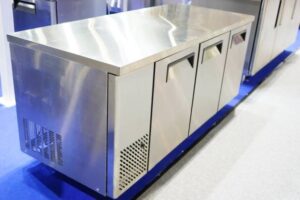Commercial refrigeration is a popular way to keep food and beverages cold. Restaurants, fast food establishments, supermarkets, and convenience stores use this equipment to ensure that foods last longer.
Refrigeration equipment never stops running, so it must be adequately maintained to avoid breakdowns and lost products. Read on to learn about some of the advantages of commercial refrigeration!
Energy Efficiency
Commercial refrigeration equipment is necessary for businesses to keep products and ingredients chilled. These systems can be found in many locations, including grocery stores, convenience stores, and restaurants.
However, commercial refrigerators and freezers often use much energy to run effectively, primarily when used daily. Therefore, these units must be specially engineered to withstand continuous use and maintain proper temperatures.
It means that their cooling systems, compressors, and fans must be larger than the ones in a domestic unit. These upgrades are necessary for the equipment to perform well, be environmentally friendly and last long.
Fortunately, there are a few ways to improve the efficiency of your commercial refrigeration equipment and save money on electricity costs. Some of these methods include; ensuring that you only operate the commercial fridges and freezers when needed, using LED light bulbs in your equipment, and choosing ENERGY STAR(r)-certified models for your business.
Another way to reduce commercial refrigeration energy usage is to ensure your equipment is always insulated. It will prevent the equipment from overheating and will make it work more efficiently.
In addition, making sure that the doors of your commercial fridges and freezers are closed whenever possible can help you save even more energy. The airflow inside the unit will be more effective if it doesn’t have to fight against the heat from open doors.
Finally, it’s essential to consider the location of your Cold-Logic commercial refrigeration Melbourne equipment. It should be located away from the kitchen and other high-temperature areas.
 It’s also important to avoid overfilling the commercial fridge and freezer, affecting energy efficiency. In addition, it can cause the refrigeration system to work harder than it needs to and damage the equipment.
It’s also important to avoid overfilling the commercial fridge and freezer, affecting energy efficiency. In addition, it can cause the refrigeration system to work harder than it needs to and damage the equipment.
In maximising your commercial refrigeration equipment’s energy efficiency, choosing the proper refrigerants is essential. Many newer refrigerants are more eco-friendly and have a lower carbon footprint than their predecessors. In addition, they are more resistant to ozone depletion and global warming, which can reduce your overall energy expenses and positively impact the planet.
Environment Friendly
The refrigeration industry plays a big part in keeping our food fresh and ensuring medicines stay safe from contamination. In factories, warehouses and offices worldwide, refrigerants help keep goods frozen and cold until needed. In many countries, refrigerated storage is also essential in cold chains, ensuring our vaccines and other life-saving medications reach us quickly and efficiently.
Commercial refrigeration equipment uses gases or liquids that change from gas to drink as they absorb heat. It allows them to cool and dehumidify rooms or fridges without much energy input. Similarly, air conditioning systems use a similar process to reduce the temperature of the air.
However, the chemicals used in refrigerants have been linked to global warming and other environmental problems. In 1987, the Montreal Protocol agreed to phase out chlorine-based refrigerants called chlorofluorocarbons (CFCs) and hydrochlorofluorocarbons (HCFCs), responsible for damaging the ozone layer and contributing to climate change.
In the meantime, CFCs have been replaced by hydrofluorocarbons (HFCs), which are 1,000 to 9,000 times more potent than CO2 in terms of their impact on the climate. HFCs are now under pressure to be phased out; some manufacturers are already phasing them out.
The chemicals are rated for their Global Warming Potential (GWP), measuring the amount of heat one unit of gas would add to the atmosphere over 100 years. The lower the GWP, the less harmful to the environment it is.
For example, a green gas like R290 propane is much better for the planet than hydrofluorocarbons (HFCs) or carbon dioxide. It is also more efficient, which helps businesses save money on electricity bills.
Another way that companies are trying to make their refrigeration greener is by using water instead of refrigerants. For example, companies have developed a system that uses water to cool merchandise in display cases. According to the company, it produces little pollution and uses up to half the energy of traditional cooling technology.
With the threat of climate change looming, it is no wonder that the refrigeration industry is undergoing a major overhaul to reduce its carbon footprint. It includes how refrigerant is produced and disposed of and how appliances are used and recycled once they have served their purpose.
Economical
Commercial refrigeration is vital to many business operations, from supermarkets and big chain stores to convenience stores and truck stops. It’s a large industry, and it can significantly impact the environment.
In recent years, many people have become more concerned about the environmental effects of refrigerators and other appliances. It is partly because of the global climate crisis and other factors but also because of a growing awareness that some refrigerants contribute to greenhouse gas emissions.
However, there are several economic benefits to using energy-efficient refrigeration systems. First, it can save you money on your electricity bill, which is excellent for your business. It’s also good for the environment because it can help to reduce the amount of carbon dioxide in the atmosphere.
A third economic benefit to using energy-efficient refrigerators is that it helps to protect the environment. So it is because a significant amount of the electricity used commercially comes from coal, significantly impacts global warming.
Refrigeration is one most significantargest contributors to greenhouse gas emissions. It is because large appliances used commercially use a lot of energy to operate. So that’s essential to consider energy efficiency when choosing a new appliance.
For businesses that need large refrigerators, energy-efficient options can be a game changer. First, they can save a lot of money on their power bills, which can significantly benefit your business.
